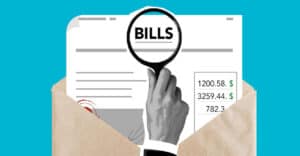Home ∙ Credit Score Ranges ∙ 430 credit score
A 430 credit score falls within the “very poor” range (300–579). Improve it by building a positive payment history and avoiding unnecessary debt. Set up a budget to keep your finances organized and manage expenses effectively.
According to Experian, 16% of consumers have a FICO score between 300 and 579.1
People with a credit score in the “very poor” range are probably new to handling their own finances and, therefore, have little credit history, or they are recovering from one or more financial hardships. If you have a poor credit score and are looking for ways to improve your situation, good news, you’ve come to the right place!
Key Takeaways for a 430 Credit Score
Overview of Your
Credit Rating
A 430 credit score is a very low score to have. This score is part of the “very poor” credit category, including all scores between 300 and 579.
Borrowing Options With a
430 Credit Score
With a 430 credit score, you may not have many loan options. While some secured loans may be available, you should consider your non-loan alternatives first before turning to these kinds of loans.
Improving a 430
Credit/FICO Score
Consumers can start to improve their credit by making their due payments on time, paying off existing debts, and working on lowering their overall credit utilization ratio.
Is a 430 Credit Score Good?
430 isn’t exactly a good credit score. Actually, it’s a part of the lowest credit scoring tier, referred to as the “very poor” category. All scores between 300 and 579 are usually labeled as bad credit according to most credit scoring models.
What Can You Get Approved for?
Self
4.6 Ninja Star Rating
- Build credit while building savings
- No hard credit pull
- Automatic payments
- Reports to all bureaus
Self is a lender that offers a responsible way for borrowers to establish payment history and build credit while building savings, through a Credit Builder Account* — It’s an installment loan secured in a CD, and you get the money back at the end of the term, minus interest and fees.
Start Building Your Credit Score Today!
Katapult Lending
4.4 Trustpilot Rating
- lease purchase plans
- Simple process
- No hidden fees
- No credit required
Katapult offers lease purchase plans and paths to ownership for consumers who typically don’t have many financing options. If you’re considering a large purchase but you don’t have great credit, then Katapult may be able to help. They offer solutions with no credit required, and no late fees.
No Minimum Credit Score Required
Yendo
4.4 Google Rating
- Vehicle-secured credit card
- Up to $10,000 in revolving credit
- Quick & easy pre approval
- Build credit with responsible usage
Yendo is the first vehicle secured credit card. This means you can still get approved for their credit card, even with a less-than-perfect credit score. They use the value of your car to help determine your credit limit. They offer credit limits up to $10,000 with no hard credit inquiry.
Must Meet Their Approval Criteria
Applying for an additional loan or credit card when you are working on improving your credit history may not be the most productive financial move. But, we all run into financial emergencies and need some extra cash from time to time.
Below are a few common types of loans and lines of credit:
Personal Loan
Personal loans are a broad category of financial products that include installment loans, secured loans, unsecured loans, mortgages, car loans, and more. Usually, personal loan lenders will base approval on the borrower’s creditworthiness, but there are special types of personal loans designed for borrowers with lower credit scores as well.
Personal loans can be variable-rate or fixed-rate loans. When a loan has variable rates, interest rate charges may fluctuate with each payment. Variable rates also mean that minimum monthly payment amounts may fluctuate as borrowers repay their loans. When a loan has fixed rates, interest rate charges–and therefore monthly payments—will stay the same throughout the loan terms. While variable rates may help borrowers save money some months, the predictability and consistency of fixed rates are usually preferred by bad credit borrowers.
Bank Loans
One of the most common places people can get installment loans is at a bank. However, banks usually only work with borrowers who have excellent credit scores. If you have a score in the “very poor” range, you are probably better off finding a loan with a credit union or other private lender.
Credit Cards
An unsecured credit card is a type of revolving credit, which means borrowers have access to a set credit limit every month. As the borrower spends against that credit limit, they accrue a monthly balance. At the end of the month or billing period, borrowers must repay at least a portion of that balance. Then, their credit limit renews, and the cycle continues.
Credit card accounts can be a great financial tool, allowing consumers to consistently access cash without having to reapply for loans. But it’s also really easy to accumulate unaffordable credit card debt if borrowers don’t pay off their balances consistently.
Secured Credit Card
For consumers who want access to a line of credit but are worried about making their debt situation worse, a secured credit card may be a great financial solution. With secured credit cards, borrowers prepay their credit limit upfront. Then, as they spend against that limit, they must pay off their balance in order for their credit limit to be fully renewed.
Some popular secured credit card products include:
- Discover it® Secured Credit Card
- Chime Secured Credit Builder Visa® Credit Card
- Self Secured Visa® Credit Card
- Capital One Platinum Secured Credit Card
- OpenSky® Secured Visa® Credit Card
Car Loans
Auto loans are a type of secured loan that consumers can use to purchase a new or used vehicle. With a low credit score, it may be difficult to get approved for many types of auto loan products. But, some tips that may be able to help you get approval on auto loans are:
- Use a co-signer on your auto loan
- Contribute a higher down payment
- Look at less expensive cars so you can get a cheaper auto loan
Poor Credit Score Loans
Meeting the minimum credit score requirements for most traditional loans may be difficult when your score is in the “very poor” range. Instead, you may have better luck with bad credit loans. Below are a few types of loans designed specifically for consumers with a poor credit history.
Credit Builder Loans
One type of personal loan that may work well for consumers with a 430 credit score is a credit builder loan. While these loans usually come with lower funding amounts, successfully repaying the balance can lead to an increase in your FICO score!
Title Loans
Title loans are a type of secured loan that uses the borrower’s vehicle title as collateral. During the terms of a car title loan, the lender will sign onto the vehicle title as a lien holder, giving them partial ownership over the borrower’s car. While borrowers can usually keep their car to drive like normal while they repay their loan, should they miss or become delinquent on payments, the lender has the right to repossess their vehicle.
Payday Loans
Payday loans are a kind of cash advance loan commonly used by consumers who are in need of a few hundred dollars or less, usually while in between paychecks. Given their purpose and design, lenders usually expect borrowers to repay their payday loans in full within about two weeks or less. So, unless you think you can pay off your payday loan within that time frame, you may want to steer clear of this kind of funding as the high interest rates pose a huge debt risk for consumers.
Products to Help Improve a 430 Credit Score
Below are a few products and tools that can help consumers improve their average credit score.
Budgeting Apps
Budgeting is essential for keeping your finances organized and making sure you have all your bills covered. If you are new to handling your own finances or are feeling overwhelmed by your current financial situation, you may find a budgeting app helpful. Some apps you can download today are:
- Empower
- Honeydue
- PocketGuard
- Goodbudget
- YNAB (You Need a Budget)
- Simplifi
Credit History and Report Monitoring
While trying to improve your credit history, it’s important to keep a close eye on your credit report. That way, you can see how your financial habits are affecting your overall credit score in real time. You can also use credit monitoring services to help track your reports. These services may be able to identify errors or inconsistencies that you may have missed that could be bringing your credit score down for no reason!
Some popular credit monitoring services are:
- Aura
- LifeLock
- OmniWatch
- IdentityGuard
- Zander
- IDShield
- IdentityIQ
Credit-Boosting Services
Did you know that not every on-time payment you make is reported to the credit bureaus? That could mean you have a positive payment history that your credit score isn’t benefiting from! Services like Experian Boost, TurboTenant, UltraFICO, and Grow Credit can help ensure that credit bureaus track payments like rent, subscriptions, phone bills, and other bills you already pay and count them towards your overall credit score.
Credit Counseling
Below is a quick overview of credit counseling services:
Feature | Description |
Purpose | To help individuals manage their debt, improve their credit score, and offer financial education. |
Services Offered | Budget counseling, debt management plans, financial education, bankruptcy counseling. |
Benefits | Lower interest rates on debt, waived fees, structured payment plan, financial stability. |
Typical Costs | Often free for initial consultation; fees for ongoing management vary by agency. |
Duration | Counseling sessions typically last 60-90 minutes; debt management plans can last 3-5 years. |
Eligibility | Generally available to anyone, especially beneficial for those with bad credit scores. |
Impact on Credit Score | Positive impact over time if the plan is followed; initial impact may be neutral or negative. |
Success Rate | High success rates for those who complete the plans; depends on individual circumstances. |
How to Start | Contact a non-profit credit counseling agency accredited by the NFCC or FCAA. |
Things to Avoid | Avoid agencies that charge high upfront fees or guarantee quick fixes to credit scores. |
Disclaimer: This informational table is intended for general guidance only and does not constitute professional financial advice. For specific advice tailored to your personal circumstances, it is recommended to consult with a licensed financial advisor or credit counseling service.
Benefits of Improving Your 430 Credit Score
Once you have a better credit score, you’ll be able to enjoy tons of benefits. Some of those benefits include:
- Faster loan approval
- Lower interest rates
- Special pre-approval offers and credit limit increases
- Approval for higher loan amounts
- Better insurance premiums
How to Improve Your 430 Score
A few tips that can help consumers improve their FICO credit scores are:
Understand How Your Credit History Works
If you are unfamiliar with how credit reports work, don’t sweat it, you’re not alone! In fact, approximately 56% of Americans don’t know that their credit scores could be different depending on which credit bureau they ask.2
To give a quick overview, your credit report is an official record of your credit history as reported by the three major credit bureaus (Experian, Equifax, and TransUnion). On your credit report, you will find data from five basic financial categories. Those categories are:
- Payment history (makes up 35% of your score)
- Debts/amounts owed (makes up 30% of your score)
- Length of credit history (makes up 15% of your score)
- New credit (makes up 10% of your score)
- Credit mix (makes up 10% of your score)
Prioritize Your Payment History
As you can see, making your payments on time is the most influential habit you can adopt to help improve your credit scores. To avoid having missed payments on your credit file, set reminders on your computer or smartphone when your payments are due. You can also sign up for autopay, which will automatically deduct your payments from your checking account on their due dates.
Watch Your Spending
Open your bank or checking account and take a look at your spending history. Are you spending money on just bills, groceries, and other necessities? Or do you have a habit of impulse shopping and spending money on things you don’t really need? Cleaning up your spending habits can help you reign in your credit utilization and avoid making your debt situation worse. Most financial experts recommend that consumers keep their credit utilization at no higher than 30%
Keep Old Credit Accounts Open
If you have multiple credit accounts you don’t regularly use, don’t close them! Simply keep them open and continue to not use them. Having open credit accounts helps improve your credit utilization, so, closing these accounts, even if they are unused, could have a negative effect on your credit mix and credit score.
FAQs About 430 Credit Scores
How often should I check my credit report if I have a 430 credit score?
If you have a 430 credit score, it’s crucial to monitor your credit report regularly to understand how different actions affect your score and to spot any errors or fraudulent activities early. Ideally, you should check your credit report at least once every three months. Many free services allow you to view your credit report without negatively impacting your score. Regular monitoring helps you track your progress as you work on improving your credit score and ensures that the information is accurate and up-to-date.
What strategies can I use to manage high credit card debt with a 430 credit score?
Managing high credit card debt effectively is essential, especially with a 430 credit score. Consider strategies such as:
- Debt Snowball Method: Start by paying off the smallest debts first while making minimum payments on others. This can build momentum and motivation as you see debts being fully paid.
- Debt Consolidation: If possible, consolidate multiple credit card debts into a single payment with a lower interest rate. This can simplify payments and potentially reduce the amount of interest you pay.
- Negotiate with Creditors: Reach out to your creditors to negotiate lower interest rates or establish a modified payment plan that fits your current financial situation.
Is it advisable to apply for an unsecured credit card to improve a 430 credit score, and what should I consider?
While obtaining an unsecured credit card can be challenging with a 430 credit score, it might still be possible to get approved for cards designed for lower credit scores. However, here are some considerations:
- High Interest Rates: Unsecured credit cards for low credit scores often come with high-interest rates. Evaluate if the cost of the interest is manageable within your budget.
- Credit Utilization: Keep your credit utilization low (ideally under 30%) to positively impact your credit score. High utilization can lower your score further.
- Fees: Be aware of annual fees or other charges that might come with the card. Weigh these costs against the potential benefits of having the card.
What Interest Rate Can I Get With a 430 Credit Score?
Unfortunately, for most personal loan and credit card products, interest rates will be on the higher side when you have a lower credit score. Since lenders are statistically taking a bigger risk when loaning money to consumers with bad credit, they normally charge higher interest rates to offset that risk. As you improve your credit scores and credit history, lenders will see that you are a financially responsible consumer and are, therefore, more likely to offer you lower interest rates!
Can I Buy a House With a 430 Credit Score?
Buying a house on your own when you don’t have a good credit score may be extremely difficult. While there are special loans designed to help bad credit borrowers get home loans, the minimum credit score requirement for these types of funding is about 580.
If you are buying a home with a partner, spouse, etc., and the other person has a higher credit score, then buying a home might be possible. However, your low credit score may still pose a risk, even then. The best way to increase your chances of getting a good deal on a mortgage loan is to work on improving your overall credit score.
Top 5 Resources for a 430 Credit Score
References:
- 430 Credit Score: Is it Good or Bad? | Experian
- Must-Know Credit Repair Statistics [Latest Report] | Gitnux





